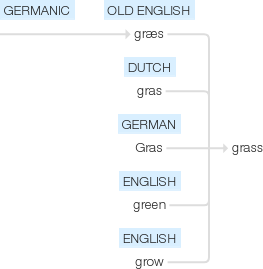Grass
Old English græs, of Germanic origin; related to Dutch gras, German Gras, also ultimately to green and grow.
wiktionary
From Middle English gras, gres, gers, from Old English græs, gærs(“grass, blade of grass, herb, young corn, hay, plant; pasture”), from Proto-West Germanic *gras(“grass”), from Proto-Germanic *grasą(“grass”), from Proto-Indo-European *gʰreh₁-(“to grow”).
etymonline
grass (n.)
Old English græs, gærs "herb, plant, grass," from Proto-Germanic *grasan (source also of Old Frisian gers "grass, turf, kind of grass," Old Norse, Old Saxon, Dutch, Old High German, German, Gothic gras, Swedish gräs"grass"), which, according to Watkins, is from PIE *ghros- "young shoot, sprout," from root *ghre- "to grow, become green," thus related to grow and green, but not to Latin grāmen "grass, plant, herb." But Boutkan considers grāmen the only reliable cognate and proposes a substrate origin.
As a color name (especially grass-green, Old English græsgrene) by c. 1300. Sense of "marijuana" is recorded by 1932, American English. The grass skirt worn by people native to tropical regions is mentioned by 1874; the warning to keep off the grass by 1843 (in New York City's Central Park). Grass-fed of cattle, etc., (opposed to stall-fed) is from 1774.
